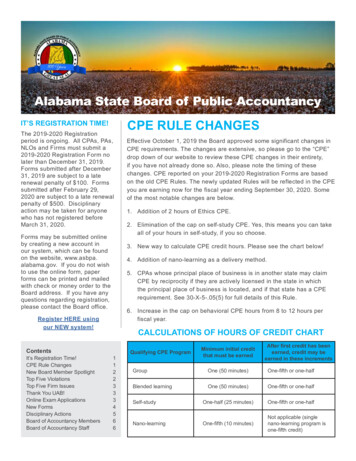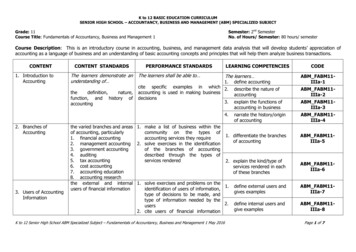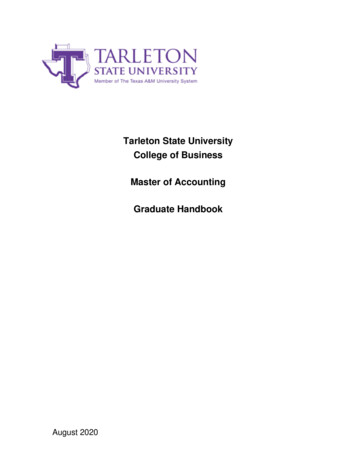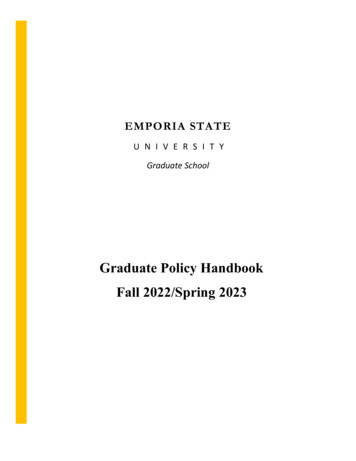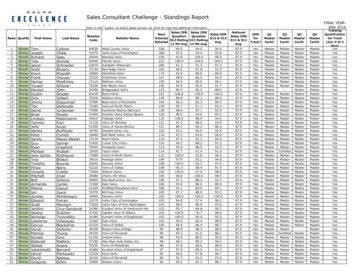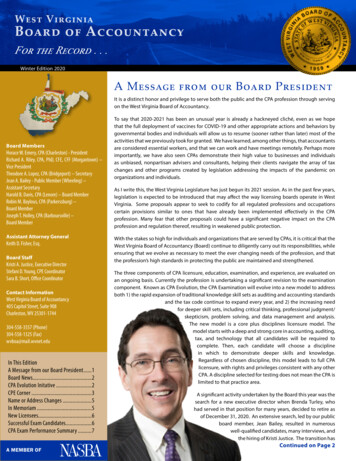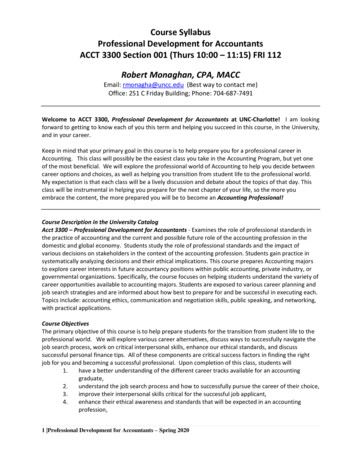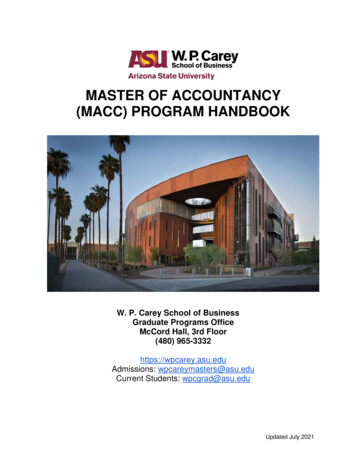
Transcription
MASTER OF ACCOUNTANCY(MACC) PROGRAM HANDBOOKW. P. Carey School of BusinessGraduate Programs OfficeMcCord Hall, 3rd Floor(480) 965-3332https://wpcarey.asu.eduAdmissions: wpcareymasters@asu.eduCurrent Students: wpcgrad@asu.eduUpdated July 2021
2
TABLE OF CONTENTSWelcome to the W. P. Carey School of Business3Diversity, Equity, & Inclusion at W. P. Carey4Program Overview6MACC Program Curriculum7Graduate Conduct and Professionalism Policy8Academic Policies12W. P. Carey Tuition Refund Policy18Student ResourcesProgram OperationsCareer Management and Employer EngagementStudent Clubs and OrganizationsProfessional Development Funding OptionsProgram Contacts20WELCOME TO THE W. P. CAREY SCHOOL OF BUSINESS3
Solutions for the planet mean developing problem-solvers from around the globe. Fromthousands of outstanding students who join us every year from around the world to our worldrenowned faculty representing six continents, the W. P. Carey School welcomes diversity andencourages global thinking.Grad school is a major undertaking, whether you’re returning to school full-time or you’reearning a degree while you work. At the W. P. Carey School, we’re here to help you succeed inthe classroom and beyond.Whether you have questions about the curriculum, financial aid, or how to take advantage ofcareer resources for W. P. Carey graduate students, you can get all the answers you need righthere.We measure success not by who we exclude, but who we include,, with one vision in mind:To create leaders who rethink the nature of business, engage the world, and create a betterfuture.Check out our news and research website to learn more about our community’s success.RankingsThe W. P. Carey School of Business delivers excellent quality and great value. It is one of thetop business schools in the country, highly ranked for academics, groundbreaking research, andstudent outcomes. Read more about the current rankings here.DIVERSITY, EQUITY, & INCLUSION AT W. P. CAREYAt W. P. Carey, we say that “business is personal.” Each student, each faculty member, eachemployee matters, intrinsically, as a human being. Yet we also must recognize times where we4
as a community have fallen short of that ideal, and how historical prejudice and systemic racismhave pushed members of our school to the margins.We are committed to doing better, and unequivocally state our support of Black lives, Nativecommunities, immigrants, members of the LGBTQIA community, people with disabilities, andothers who live at the intersections. You are welcome at W. P. Carey, and this is what you canexpect from us.Commitments to diversity, equity and inclusion We embrace open access to education and opportunity for all students as beingcentral to our mission. We believe that diversity is a necessary part of excellence, and reject any falseopposition of diversity and merit. We support robust and respectful discussion of the most pressing issues insociety from the wide variety of perspectives in our community. We respect, listen to, and center the voices of marginalized groups, andrecognize that the impacts of our actions matter more than the intention. We are unequivocal in our support of underrepresented and historicallymarginalized groups, and will not tolerate discrimination or hate.Diversity, equity, and inclusion (DEI) initiativesThe initiatives below are a partial list of the many DEI activities being pursued and considered atW. P. Carey.Diversity, Equity, and Inclusion Committee - formed in response to ongoing police violenceagainst Black Americans, the DEI committee is now a permanent part of W. P. Carey; the groupdirects all DEI initiatives at W. P. Carey and serves as an advisory board to school leadership.College Data Committee - this group is charged with compiling and distributing relevant DEIdata for W. P. Carey; this includes diversity metrics, surveys, and benchmarking.Inclusive Teaching & Learning Committee - a combination of faculty, staff, and studentcommittee members working to integrate DEI principles into W. P. Carey curriculum andclassrooms.DEI training for faculty and staff - “To be Welcoming” training, in partnership with ASU andStarbucks, suggested for all staff; also exploring future mandatory training options foremployees and students.Diversifying purchasing - In concert with ASU purchasing and community groups, we are takingan intentional look at diversifying W. P. Carey purchases, including food, supplies, and services.5
Inclusive onboarding - Human Resources is creating a booklet for new employees that includesemployee resource groups and culturally relevant services, such as Black salons, doctors, andmore.Diversifying recruiting - Human Resources and student recruiting functions are in the earlystages of identifying more inclusive recruitment practices, including expanded recruitment fromHBCUs, continued involvement in the PhD Project, and more.Expanded access to mentors - using the existing W. P. Carey mentorship program as a startingpoint, expand the number of qualified minority mentors for the undergraduate, graduate, andExecutive Connections program.W. P. Carey is also actively involved with the larger ASU community’s commitment to supportBlack students, faculty, and staff. Read more about university-led efforts.Land AcknowledgementThe W. P. Carey School of Business acknowledges the 22 Tribal Nations that have inhabitedthis land for centuries. Arizona State University's four campuses are located in the Salt RiverValley on ancestral homelands of many Indigenous peoples, including the Akimel O’odham(Pima) and Pee Posh (Maricopa), whose care and keeping of these lands allows us to be heretoday and provides a guide for our relationship with these lands in the future. W. P. Careyacknowledges the sovereignty of these tribal nations and seeks to foster an environment ofsuccess and possibility for American Indian students, and to work alongside Indigenous peoplein business practices and knowledges that support Native experiences and prosperity.More resources: ASU Student Accessibility and Inclusive Learning ServicesStudents with FamiliesInternational Student EngagementOut @ ASUASU Council of CoalitionsPat Tillman Veterans CenterPROGRAM OVERVIEWThe nine-month MACC program is delivered by the W. P. Carey School of Accountancy, highlyranked by the Public Accounting Report. The cutting-edge curriculum is structured to providestudents with an in-depth working knowledge of advanced accounting topics that are most6
relevant in today's business environment and reviewed every year with input from accountingprofessionals and alumni. Esteemed faculty experts bring real-world experience into each class,giving the degree even more long-term value.The Master of Accountancy program is designed for individuals who want to immersethemselves in full-time graduate studies, take classes during the day and fulfill courserequirements for the CPA exam in both Arizona and California. Because of the quality of theMaster of Accountancy program, students gain the skills and knowledge needed to launch theiraccounting careers while opening the door to top hiring firms.7
MACC PROGRAM CURRICULUMCourseDescriptionACC 588Professional Accounting Research13ACC 520Accounting Analytics I13ACC 591Professional Responsibilities I11ACC 510Internal Controls, Audit, & Fraud Prevention & Detection23ACC 521Accounting Analytics II23ACC 591Professional Responsibilities II21ACC 512Advanced Auditing33ACC 586Shareholder Value Creation33ACC 511Accounting for Income Taxes (elective)orCorporate Governance, Ethics and SustainabilityReporting (elective)orPerformance Measurement for Strategic Alignment(elective)333333ACC 581QuarterACC 585CreditsACC 522Innovations with Auditing Technology43ACC 591Professional Responsibilities III41ACC 513Advanced Financial Accounting (elective)orFamily Financial, Tax and Wealth Transfer Planning(elective)4343ACC 5758
W. P. CAREY SCHOOL OF BUSINESS GRADUATE STUDENTCONDUCT AND PROFESSIONALISM POLICY:We, the students of the W.P. Carey Master’s programs are committed to maintaining the highestlevels of honesty, integrity, and professional courtesy for ourselves and amongst ourclassmates. We believe that ethical behavior is not only the cornerstone of a good academicprogram, but of good business as well. As such, we are steadfast in our commitment to thefollowing principles: Academic Integrity — We view the W. P. Carey Academic Integrity Policy as a living,breathing document, not just concepts on a page. As such, we are resolute in ensuringthat we abide by the principles contained within, both in letter and in spirit. Furthermore,we will hold our classmates to the same high standards to which we hold ourselves. Consideration of Others — As W. P. Carey students, we believe that we should treatothers as we wish to be treated. To this end, we will be considerate of classmates,professors, and recruiters in all aspects. Furthermore, we will constructively add to thecollaborative environment by helping and encouraging others. Professionalism — As W. P. Carey students, we believe that the behaviors we practicetoday will become a habit in the future. To that end, we are committed to act in aprofessional manner in all school settings, including classes, networking events, andinterviews. We will be cognizant of the fact that we are representing the program and ourclassmates at all times.Professionalism PolicyProfessionalism, broadly speaking, includes ethical decision-making, consideration of others,and demonstration of personal accountability. Exhibiting professional behavior is integral to apositive learning environment within the university and promotes innovation, openness todiversity, integrity, and mutual respect for students, faculty, and staff.W. P. Carey students are expected to treat others as they wish to be treated. Students will beconsiderate of classmates, professors, staff and recruiters in all aspects and commit to acting ina professional manner in all school settings, including classes, sponsored events, andinterviews.CommunicationAll communication, whether oral or written, should be in a professional tone and format. In yourcourses your instructor should set forth procedures for communication including posted officehours, making appointments, and providing contact information.Examples of behaviors expected when participating in activities associated with W. P. CareySchool of Business: Communicate clearly, promptly and in a respectful manner with students, staff,colleagues, instructors, and the public.9
Participate in verbal and written interactions in an equitable and respectful manner.Maintain professionalism in interpersonal relationships, manner, appearance, hygieneand communication (including electronic communication).Accept feedback and make good faith attempts to improve performance based onfeedback.Examples of behaviors that do not meet this standard: Consistently interrupt, show disrespect toward, ignore or belittle people. Use or display inappropriate language (profanity, obscenities, hate speech) withstudents, faculty, staff, and/or other professionals. Consistently make disruptive, rude, argumentative, confrontational or intimidatingcomments in a classroom or professional setting.ClassroomThe classroom (in-person or online) should be an environment that fosters learning and sharingideas. This type of environment works best when students arrive to class on time, prepared, andwith an open mind. It is vital to the learning process that each student demonstrates respect forthe instructor, classmates, and course content.Examples of behaviors expected when participating in activities associated with W. P. CareySchool of Business: Address, with the appropriate faculty member or administrator, any instance in whichthere is a suspicion or knowledge of an academic integrity violation or professionalmisconduct by a student or faculty member. Unless it is appropriate for the class activity, silence all electronic devices when youenter the classroom. Respect your professors, teaching assistants, and peers by refraining from disruptivebehavior such as engaging in non-classroom related activities during class time.Examples of behaviors that do not meet this standard: Fail to complete or follow through on projects and/or commitments on time and bydeadlines. Consistently disparage professional development activities or academic learning. Disruptive or inappropriate behavior, including consistent absence or excessive tardiesto class(es) without an excusable reason.Co-curricularCo-curricular conduct — behavior beyond the classroom — including appearance, behavior,and online presence has far reaching effects. Faculty, employers, recruiters, and futureprofessional peers may form positive or negative perceptions based on what they see or hear.W. P. Carey students should conduct themselves as professionals with integrity in theclassroom, in the workplace, and in associated activities.10
Examples of behaviors expected when participating in activities associated with W. P. CareySchool of Business: Act as a responsible group member: attend meetings and contribute equitably todiscussions, workload, and presentations. Demonstrate respect and care for University property. Honor appointments with faculty, staff, advisors, recruiters, and employers. Understand that employers may search social media sites when making hiring decisions.Examples of behaviors that do not meet this standard: Violation of school, university, or workplace policies, or the law. Fail to honor commitments to attend events, which includes arriving on time anddressing appropriately. Dress in attire that could be considered inappropriate for the event, classroom, orworkplace. Misuse electronic media, using threatening or self-destructive behaviors. Disruptive or inappropriate behavior during experiential learning opportunities, such asconferences, field studies, international travel, etc.TechnologyUse of personal or public desktops, tablets, laptops, cell phones and other electronic deviceswhile engaging in university business should be conducted in a respectful and professionalmanner.Examples of behaviors expected when participating in activities associated with W. P. CareySchool of Business: Be mindful of using technology in academic and non-academic settings (meetings,internships, at the workplace, and/or University sponsored events). Respect public workstations during use. Ensure space is clean and operable for futureuse and report faulty equipment to appropriate staff.Examples of behaviors that do not meet this standard: Use of devices that are distracting, and/or impede safe movement of others throughclassroom and non-classroom spaces (use of cords, wall plugs, etc.). Inappropriate use of university equipment for personal use or gain.If a student is reported as violating the Professionalism Policy, the Assistant Dean of AcademicAffairs will evaluate the information to determine an appropriate course of action to gather thefacts. A student alleged to have violated the Professionalism Policy will be provided notice ofalleged misconduct and provided with an opportunity to respond.If the student is found to be in violation of the Professionalism Policy, the Assistant Dean ofAcademic Affairs, in conjunction with the faculty director of the academic program, will11
determine the disciplinary action. For violations that are determined to be moderate in severity,remediation could include being put on academic probation combined with mandatory follow-upmeetings. For more severe violations or repeat behavior, consequences may be arecommendation for dismissal from the academic program.Any violation of the ASU Student Code of Conduct will be reported to the Office of StudentRights and ResponsibilitiesStudent ResourcesArizona Board of Regents Student Code of rizona State University Academic Integrity olicy12
W. P. CAREY SPECIALIZED MASTERS ACADEMIC POLICIES2021-22 Specialized Master’s Programs Academic PoliciesPROGRAMS: Master of Science in Management, Master of Real Estate Development, Masterof Finance, Master of Science in Global Logistics, Master of Science in Information SystemsManagement, Master of Science in Business Analytics, Master of Accountancy, Master ofTaxation, Master of Science in Supply Chain ManagementThe academic records of graduate students are reviewed at the completion of each course toensure that satisfactory progress and minimum standards are being met. Students mustcomplete required courses in the order specified for their W. P. Carey Specialized Master’sProgram. It is each student’s responsibility to understand how this policy may impact his/herability to complete their Specialized Master’s degree. W. P. Carey School of BusinessGraduate Programs reserves the right to enforce the academic policies outlined below.Specialized masters programs vary in length. Some application of time frames detailed in thesepolicies may not apply based on program length. Please speak with your coordinator regardingany questions.DEGREE REQUIREMENTS SUMMARY: To be eligible for a degree from the GraduateCollege, master’s degree students must maintain Satisfactory Academic Progress and achievethe benchmarks and requirements set by the individual degree programs as well as theGraduate College. These, as well as all other Graduate College policies, can be found in theASU Graduate Policies and Procedures.Satisfactory Academic Progress1. Maintain a minimum 3.0 for all GPAs. The iPOS GPA is calculated on all courses that appear on the student’s approvediPOS (with the exception of LAW and Transfer credits). Cumulative ASU GPA represents all courses completed at ASU during thegraduate career. The Overall Graduate GPA is based on all courses numbered 500 or higher thatappear on the transcript after admission to a graduate program or graduate nondegree. This includes shared coursework if in an approved acceleratedbachelor’s/master’s program. Courses with grades of “D” (1.00) and “E” (0.00) cannot appear on the iPOS but willbe included when calculating the Graduate GPA. Courses with an “I” grade cannotappear on the iPOS.2. Satisfy all requirements of the graduate degree program.3. Satisfy the maximum time limit for graduation from the student’s graduate degreeprogram. A student has six years for masters; for doctoral, five years or ten years fromcomprehensive exams (whichever comes first).4. Successfully pass comprehensive exams, qualifying exams, foreign language exams,and the oral defense of the proposal/prospectus for the thesis or dissertation.5. Successfully complete the culminating experience with a grade of B (3.00) or higher.6. Graduate students must remain continuously enrolled in their degree program. Failing todo so without a Graduate College approved Leave of Absence is considered to be a lackof academic progress and could result in discontinuation from the program.13
A student who fails to make satisfactory progress in pursuit of the W. P. Carey SpecializedMaster’s Program degree will be provided notice from the W. P. Carey Graduate ProgramsOffice, Program Operations department as soon as the applicable grade(s) have beenidentified.COURSE COMPLETION REQUIREMENT: A student must complete all W. P. CareySpecialized Master’s Program courses as scheduled.a) A student who withdraws from a W. P. Carey Specialized Master’s Program coursewill receive a “W” and will not be permitted to continue coursework as scheduled. Astudent who wishes to withdraw from a W. P. Carey Specialized Master’s Programcourse should contact his/her Program Operations Coordinator to discuss options,policies, and processes.b) Upon receipt of an incomplete (grade of an “I”) in any course, a student must submitto his/her Program Operations Coordinator a written plan, mutually agreed upon withthe instructor and approved by the faculty director of the program. The courseworkmust be completed prior to the start of the next academic term.c) Due to the lockstep nature of the specialized masters programs, failure to completethe course as outlined in the agreement, may result in a recommendation fordiscontinuation or dismissal.PROBATION: A W. P. Carey Specialized Master’s Program student shall be placed onprobation when he/she:a) receives a “C ” (2.33) or “C” (2.00) in any W. P. Carey Specialized Master’s Programcourse (courses and GPAs) and/orb) achieves a Cumulative ASU GPA or ASU Graduate GPA or Plan of Study (POS)grade point average (GPA) below 3.00, and/orC) has significant or repeated violation of the W. P. Carey School of BusinessGraduate Conduct and Professionalism Policy, ASU Academic Integrity, orStudent Code of Conduct.A student on probation must work with his/her Program Operations Coordinator to develop anacademic performance improvement plan that includes the conditions and timeframes formaking satisfactory academic progress in his/her degree program. A student on probation isallowed to complete coursework to bring his/her grades to an acceptable level (3.0 or above)by the end of the following academic term. Failure to do so will result in recommendation fordismissal from the W. P. Carey Specialized Master’s Program.DISCONTINUATION: A student shall be discontinued from the W. P. Carey SpecializedMaster’s Program when he/she receives: a “D” (1.00) or “E” (0.00) in any course applicable to program degree requirements(courses and GPAs) while not on probation, or a grade below “B” (3.00) on the thesis equivalency course, or an “I” grade and fails to complete coursework as outlined in the agreementA student who is discontinued must either enroll in MGT 595 Continuing Registration or havean approved leave of absence. A student must then restart his/her program as agreed and willbe placed on probation upon return.Students that fail to maintain continuous enrollment must be readmitted to the program under14
the degree requirements and policies in effect at the time of the new admission date.DISMISSAL: A student shall be recommended for dismissal from the W. P. Carey SpecializedMaster’s Program and will not be permitted to continue course work when the student:a) is on academic probation and receives a third “C ” (2.33) or “C” (2.00) in any W. P.Carey Specialized Master’s Program course, and/orb) is on academic probation and receives a “D” (1.00) or “E” (0.00) in any W. P. CareySpecialized Master’s Program, and/orc) is on academic probation and receives a grade below “B” (3.00) in the thesisequivalency coursed) returns from discontinuation and receives a grade below “B-” (2.67) in any W. P.Carey Specialized Master’s Program course, and/ore) receives a ASU Cumulative GPA of less than 3.00 upon completion ofcoursework in the academic term after being placed on academic probation,and/orf) has significant or repeated violation of the W. P. Carey School of BusinessGraduate Conduct and Professionalism Policy, ASU Academic Integrity, orStudent Code of Conduct.GRADE APPEAL POLICY: Student academic grievance procedures in the W. P. CareySchool of Business normally consider matters where the relief sought is a change of a finalgrade. Formal grievance petitions must be submitted no later than ten business days after thestart of the next academic term; the process and decision on the grade grievance will becompleted by the end of that term. Unless dismissed, a student may continue courseworkduring the appeal process. Grounds for a grade appeal:Error in calculating the final grade for the course (e.g. arithmetic error)The criteria for determining the final grade were changed from what was specified inthe syllabus (e.g. 4 quizzes were given instead of 5 or weights of assignments werechanged)The evaluation system was not consistently and fairly applied to all students (e.g.Student A and Student B reported the same answer but had different scores for theassessment item)Grievance procedure:Student submits a grade appeal with the Office of Academic Affairs (Dean’s Delegate)Student discusses grievance with course instructorIf a resolution cannot be reached with the instructor, student discusses grievance withFaculty Director and/or Department Chair.If a resolution cannot be reached with the Faculty Director, student should make anappointment to see the W. P. Carey Academic Integrity Officer. At the meeting, thestudent’s dispute will be heard again, and if it still cannot be resolved satisfactorily, aformal committee can be called to review the complaint. If the Office of Academic Affairsdetermines no fl hearing is needed, the decision is final and may not be appealed.If the Office of Academic Affairs determines a formal hearing is warranted, the grievancewill be reviewed by the W. P. Carey Standards Committee who will then make arecommendation to the Dean. All decisions are final and may not be appealed.ACADEMIC INTEGRITY REQUIREMENT:A student who engages in academic misconduct15
while attending a W. P. Carey graduate program will receive strict penalties as outlined inASU’s academic integrity policy. Those penalties ordinarily will range from a letter reduction infinal course grade to expulsion from the program and School of Business. The penalty will bedecided by the course faculty member and the Assistant Dean of Academic Affairs. Allallegations of academic misconduct must be reported to program administrators. Anysubsequent act of academic misconduct, regardless of severity, will result in dismissal from theprogram and the School of Business.The ASU student academic integrity policy lists violations in detail. These violations fallinto five broad areas that include but are not limited to:1.2.3.4.5.Cheating on an academic evaluation or assignmentPlagiarizingAcademic deceit, such as fabricating data or informationAiding academic integrity policy violations and inappropriately collaboratingFalsifying academic recordsTUITION REFUND POLICIES: ASU Tuition Refund Policy W. P. Carey Program Tuition Refund PolicyGRADUATE COLLEGE POLICIES: -formsand-deadlines/policy-manualsDEFINITIONS AND SPECIFIC ASU POLICIES:Probation: An official warning that a student is not progressing academically as requiredby the program/university. A student on probation is allowed to continue coursework.Discontinuation: Requires a student to take time off from the program based onacademic performance. The student will restart the program according to thediscontinuation agreement between the student and the Sr. Associate Dean. Uponreturn to his/her program, the student will be placed on academic probation.Dismissal: A student who is dismissed is no longer matriculated and will not be allowedto continue coursework. To be subject to dismissal, a student must first be placedon academic probation.Continuous Enrollment: Once admitted to a graduate degree program or graduatecertificate program, students must maintain continuous enrollment and beregistered for a minimum of one credit hour during all phases of their graduateeducation, including the terms in which they are admitted and graduate. Failing todo so without a Graduate College approved Leave of Absence is considered to bea lack of academic progress.Leave of Absence: Graduate students planning to discontinue registration for asemester or more must submit a Leave of Absence request via their InteractivePlan of Study (iPOS). This request must be submitted and approved before theanticipated semester of non-registration. Students may request a maximum of twosemesters of leave during their entire program. A student with a Graduate Collegeapproved Leave of Absence is not required to pay tuition and/or fees, but in turn, is16
not permitted to place any demands on university faculty or use any universityresources. These resources include university libraries, laboratories, recreationfacilities or faculty time. Having an approved Leave of Absence by the GraduateCollege will enable students to re-enter their program without re-applying to theuniversity.Plan of Study: Courses needed to meet the graduate degree requirements, comprisedof core and elective courses. Students are advised to consult with a ProgramOperations Coordinator regarding their plan of study.Thesis Equivalency Course: Students must receive a grade of B or better to pass andfulfill degree requirements. Thesis Equivalency courses are defined as follows: Master of Real Estate Development – RED 515 Synthesis Project #3Master of Finance – FIN 575 Applied Science in FinanceMaster of Science in Global Logistics – SCM 593 Applied ProjectMaster of Science in Information Management – CIS 575 Emerging TechnologiesMaster of Science in Business Analytics – SCM/CIS 593 Applied ProjectMaster of Accountancy - ACC 586 Shareholder Value Creation and FinancialStatement AnalysisMaster of Taxation - ACC 589 Multijurisdictional Tax IIIMaster of Science in Supply Chain Management – SCM 551 Advanced Supply ChainPlanning and ControlMaster of Science in Management – MGT 593 Applied ProjectVoluntary Withdrawal from a Graduate Program: If a student wishes to withdraw from agraduate program, the student should complete the Voluntary Withdrawal form.Information on other types of Withdrawal (i.e. medical withdrawal, compassionateleave), can be found at: https://students.asu.edu/drop-add.International Enrollment Policies: F-1 and J-1 students are required to maintain full-timeenrollment status (9 credit hours per semester). Academic integrity violations,withdrawal, dismissal, and/or discontinuation from a degree program can haveconsequences regarding visa status. Federal guidelines on visa status supersede W. P.Carey graduate program academic policies. For any visa status questions, contact theInternational Students and Scholars Center (ISSC) at ASU at (480) 727-47
W. P. Carey School of Business . Graduate Programs Office . McCord Hall, 3rd Floor (480) 965-3332 . https://wpcarey.asu.edu Admissions: wpcareymasters@asu.edu . To create leaders who rethink the nature of business, engage the world, and create a better future. Check out our .

